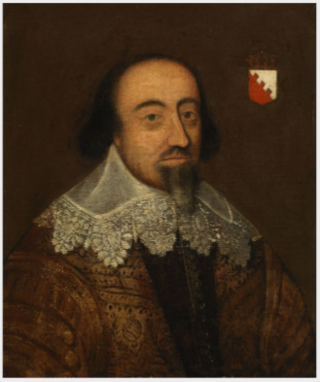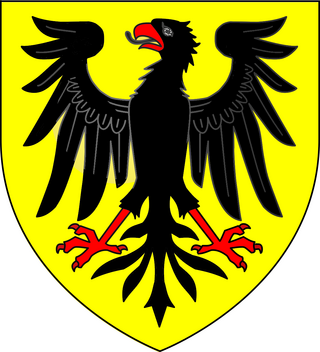Related Research Articles

Richard Boyle, 1st Earl of Cork, also known as the Great Earl of Cork, was an English politician who served as Lord Treasurer of the Kingdom of Ireland.
Thomas Lodge was an English writer and medical practitioner whose life spanned the Elizabethan and Jacobean periods.
Sir Geoffrey Fenton was an English writer, Privy Councillor, and Principal Secretary of State in Ireland.

Plantations in 16th- and 17th-century Ireland involved the confiscation of Irish-owned land by the English Crown and the colonisation of this land with settlers from Great Britain. The Crown saw the plantations as a means of controlling, anglicising and 'civilising' Gaelic Ireland. The main plantations took place from the 1550s to the 1620s, the biggest of which was the plantation of Ulster. The plantations led to the founding of many towns, massive demographic, cultural and economic changes, changes in land ownership and the landscape, and also to centuries of ethnic and sectarian conflict. They took place before and during the earliest English colonisation of the Americas, and a group known as the West Country Men were involved in both Irish and American colonization.
Sir William FitzWilliam (1526–1599) was an English Lord Justice of Ireland and afterwards Lord Deputy of Ireland. In 1587, as Governor of Fotheringhay Castle, he supervised the execution of the death sentence on Mary, Queen of Scots. He was the Member of Parliament for Peterborough and represented County Carlow in the Irish House of Commons. He lived at Gainspark, Essex, and Milton Hall.

O'Sullivan is an Irish Gaelic clan based most prominently in what is today County Cork and County Kerry. According to traditional genealogy, the O’Sullivans were descended from the ancient Eóganacht Chaisil sept of Cenél Fíngin, the founder of the clan who was placed in the 9th century, eight generations removed from Fíngen mac Áedo Duib, king of Cashel or Munster from 601 to 618. Later, they became the chief princes underneath their close kinsmen, the MacCarthy dynasty, in the small but powerful Kingdom of Desmond, successor of Cashel/Munster. The last independent ruler of the clan was Donal Cam O'Sullivan Beare, who was defeated in the Nine Years' War of 1594–1603.

Sir Thomas Temple, 1st Baronet was an English landowner and Member of Parliament.
Sir Philip Wodehouse, 1st Baronet, was an English baronet, soldier and Member of Parliament.
William Lyon was the English-born bishop of Cork, Cloyne, and Ross.
Sir Rowland Lytton was an English lawyer and politician who sat in the House of Commons variously between 1586 and 1611.
Samuel Page (1574–1630) was an English clergyman and poet.
Sir John Blennerhassett was an English-born judge and politician who became Chief Baron of the Irish Exchequer and sat in the Irish House of Commons as MP for Belfast. He was a member of a prominent Norfolk family which acquired large estates in Ireland, mainly in County Fermanagh. The Blennerhassett family have an enduring connection with County Kerry.
Lodowick Bryskett, was a poet, translator, diplomat and Irish official. He served as Special Ambassador from England to Tuscany in 1600-01.
Edward White was a London printer and stationer whose career spanned a period of over forty years. His shop in the booksellers' district of St Paul's Churchyard was at the Sign of the Gun, where he sold many anonymous works as well as works by Thomas Kyd, Robert Greene, Anthony Munday and Christopher Marlowe. Between 1594 and 1611 he sold all three quartos of William Shakespeare's Titus Andronicus.
Jesse Smythes was an English born judge and colonist in Elizabethan Ireland. He held office as Solicitor General for Ireland and Chief Justice of Munster, and was heavily involved in the Plantation of Munster. He was noted for his deep hostility to the native Irish, which was even more virulent than that of the average English colonist of the time.
William Saxey or Saxei was an English-born judge in Ireland of the late Elizabethan and early Stuart era. He was an unpopular and controversial figure with a reputation for corruption and misanthropy.
The chief justice of Munster was the senior of the two judges who assisted the Lord President of Munster in judicial matters. Despite his title of Chief Justice, full judicial authority was vested in the lord president, who had "power to hear and determine at his discretion all manner of complaints in any part of the province of Munster", and also had powers to hold commissions of oyer and terminer and gaol delivery.
Henry Gosnold or Gosnell was an English-born lawyer who spent most of his very long life in Ireland. He sat in the Irish House of Commons and held office as Chief Justice of Munster and Deputy Admiralty judge for the same province. He is now mainly remembered for his friendship with Francis Bacon. He was also famous in his own lifetime for his wit: a few of his jokes still survive.
Luke Gernon was an Irish judge who held office in seventeenth-century Ireland. He is best remembered today for his manuscript called A Discourse of Ireland. The Discourse was written in 1620, and was first published in 1904.
Sir Ambrose Forth (c.1545-1610) was an English-born civilian lawyer whose career was spent in Ireland, where he became the Irish Probate judge and later the first judge of the Irish Court of Admiralty. He has been praised as a diligent, conscientious and honest Crown official. At the same time, he devoted much effort to acquiring a large landed estate.
References
- ↑ "Becon, Richard (BCN567R2)". A Cambridge Alumni Database. University of Cambridge.
- ↑ This article incorporates text from a publication now in the public domain : Stephen, Leslie, ed. (1885). . Dictionary of National Biography . Vol. 4. London: Smith, Elder & Co. p. 92.
- ↑ Edward Chaney (1990). England and the Continental Renaissance: Essays in Honour of J.B. Trapp. Boydell Press. pp. 153–164. ISBN 978-0-85115-270-7.
DNB references
These references are found in the DNB article referred to above.